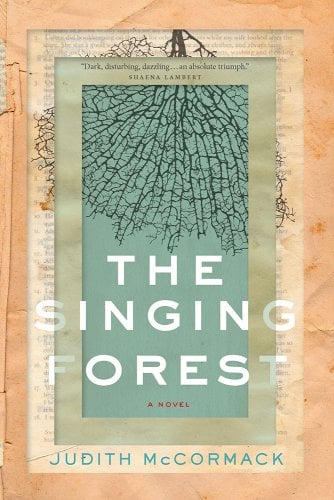The Singing Forest
Judith McCormack
January 25, 2022

Two children stumble upon a mass grave in the forest outside of Minsk in Belarus where the NKVD, Stalin’s secret police, buried tens of thousands of innocent victims of torture. The Singing Forest, by Judith McCormack (Biblioasis 2021) weaves the story of a low-rung enforcer of that torture in pre-WWII Belarus and a modern-day Canadian lawyer on the team prosecuting long-forgotten crimes. Stefan Drozd’s life from earliest childhood lacked anything resembling kindness, nurturing, or morality. He has no understanding of human interaction, never had a friend, and did whatever he had to do to survive, even when that required torturing, murder, or lying to get into Canada after the war. Years later, Drozd is in his nineties and doesn't understand why anyone is making a fuss about something that happened so long ago. Leah Jarvis, a somewhat timid and confused young lawyer from an eccentric family, is helping prosecute him for war crimes. Leah knows that Drozd is guilty, but she needs hard evidence. While working on this case, she grapples with her own history – the death of her mother, the disappearance of her father, and her erratic upbringing by three uncles. Leah questions her Jewish heritage and wonders how a person becomes evil, how power is wielded by those who have it, and how justice is served. This is a beautifully written, lyrical novel about truth, heritage, and memory.
Judith McCormack was born outside Chicago and grew up in Toronto, with brief stints in Montreal and Vancouver. Her first short story was nominated for the Journey Prize, and the next three were selected for the Coming Attractions Anthology. Her collection of stories, The Rule of Last Clear Chance, was nominated for the Commonwealth Writers Prize and the Rogers Writers' Trust Fiction Award and was named one of the best books of the year by The Globe and Mail. Her work has been published in the Harvard Review, Descant and The Fiddlehead, and one of her stories has been turned into a short film by her twin sister, Naomi McCormack, an award-winning filmmaker. Her most recent short story in the Harvard Review was recorded as a spoken word version by The Drum and has been anthologized in 14: Best Canadian Short Stories. Backspring, her first novel, was shortlisted for the Amazon First Novel Award in 2016. McCormack has several law degrees, which have mostly served to convince her that law is a branch of fiction, and she tries to point out as often as possible that Honoré de Balzac, Henry James, Paul Cézanne, Cole Porter and Geraldo Rivera were lawyers. She is a recipient of the Guthrie Award for outstanding public service and contributions to access to justice, and the Law Society Medal for outstanding service in the highest ideals of the profession.